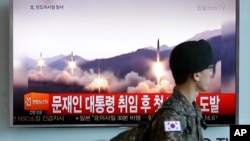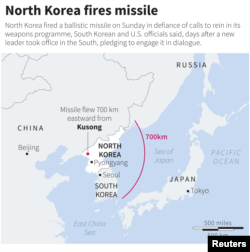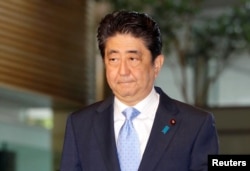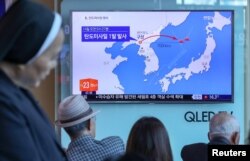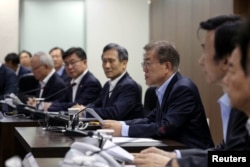The U.N. Security Council is to hold an emergency meeting Tuesday on North Korea's latest missile test.
The United States, Japan and South Korea requested the emergency discussions after Pyongyang launched a missile Sunday in an unusual high altitude ballistic path that indicated it might be a new two-stage liquid fueled rocket capable of flying up to 4,500 kilometers.
South Korea said Monday President Moon Jae-in is sending special envoys around the world as the country seeks to strengthen its global ties in the wake of North Korea's latest aggressive missile tests. The Blue House said the envoys will meet with high ranking officials to explain the new South Korean government's policy plans and exchange ideas.
Early Monday, North Korea said it successfully conducted a newly developed mid-to-long range missile test, supervised by leader Kim Jong Un and aimed at verifying the capability to carry a "large scale heavy nuclear warhead." The official news agency KCNA said the missile was launched at the highest angle so as not to affect the security of neighboring countries and flew 787 kilometers, reaching an altitude of 2,111 kilometers.
KCNA quoted Kim as accusing the United States of "browbeating" countries that "have no nukes," and warning Washington not to misjudge the reality that its mainland is in the North's "sighting range for strike."
International reaction
Russia's president said North Korea's latest missile test was "counter-productive, harmful and dangerous."
Speaking Monday in Beijing, Vladimir Putin said, "We are categorically against the expansion of the club of nuclear powers."
He urged other world leaders to "stop intimidating North Korea and find a peaceful solution to the problem."
The test, according to a White House statement, should “serve as a call for all nations to implement far stronger sanctions against North Korea.”
U.S. Ambassador to the United Nations Nikki Haley said Sunday it is time for many nations to "send a strong, unified message that this is unacceptable, and I think you'll see the international community do that." She said the United States will continue to "tighten the screws" against North Korea.
U.S. President Donald Trump said earlier this month he would be "honored" to meet with North Korean leader Kim Jong Un "under the right circumstances," but Haley said that "having a missile test is not the way to sit down with the president, because he's absolutely not going to do it."
The United Nations first imposed sanctions against North Korea in 2006 and has strengthened them several times following the communist nation's five nuclear tests and two long-range rocket launches.
Japan and South Korea also quickly condemned North Korea's action as a grave threat to the region and a violation of U.N. resolutions about North Korea's arms programs.
Japan’s prime minister, Shinzo Abe, ordered his government to “prepare for all possible contingencies,” according to his office.
“The launch of such ballistic missiles is a serious threat to our country. The defense ministry and the self-defense forces are continuing to work closely with the United States and South Korea to collect and analyze the information,” Japanese Defense Minister Tomomi Inada told reporters in Tokyo. “We will make every effort to ensure the peace and security of our country.”
She explained it was possibly a new type of missile that was fired in a high-angle orbit, reaching an altitude of more than 2,000 kilometers and flying for 30 minutes, before coming down in the Sea of Japan after a total flight of about 700 kilometers.
China called for restraint to avoid increasing tensions in the region while the Foreign Ministry expressed opposition to Pyongyang’s violation of U.N. Security Council resolutions. Beijing is North Korea’s only major ally and Pyongyang’s key trading partner.
Russian President Vladimir Putin, who is in Beijing for an international summit, expressed concern about the missile test and the escalation of tensions, according to a Kremlin spokesman.
The splash-down point was about 400 kilometers from the east coast of North Korea, according to the Japanese government.
Scientists: Not an ICBM
“This is kind of a big deal. But it’s not an ICBM. That’s the good news,” Union of Concerned Scientists co-director David Wright told VOA.
If flown on a standard trajectory, the missile fired by North Korea Sunday morning would have a range of up to 4,500 kilometers, according to Wright.
Guam, an American territory with two large U.S. military bases, is 3,400 kilometers from North Korea and until now had been considered beyond the range of the most powerful rocket North Korea is known to have developed, the Musudan, with a range of about 3,000 kilometers.
With this test, North Korea may have leapfrogged its troubled Musudan series of missiles.
“It would put together things we’ve seen them doing that they haven’t been able to put together,” Wright explained.
South Korea, US weigh in
The U.S. Pacific Command, based in Hawaii, confirmed the rocket launch but said the unidentified projectile did not appear to be large enough to be an intercontinental ballistic missile, a weapon that North Korea says it is developing.
Trump was briefed about the North Korean launch on the telephone by National Security Advisor H.R. McMaster, a White House official told VOA news.
The White House statement, which said “North Korea has been a flagrant menace for far too long” also seemed to make an indirect appeal to Moscow for stronger cooperation to counter Pyongyang.
“With the missile impacting so close to Russian soil — in fact, closer to Russia than to Japan — the President cannot imagine that Russia is pleased,” according to the White House statement issued late Saturday.
Pyongyang addresses Washington
Just one day earlier, a senior North Korean diplomat had said Pyongyang would be willing to talk with the United States about the two countries’ disputes, under the right conditions.
Choe Son Hui, the North Korean Foreign Ministry’s director general for U.S. affairs, raised the issue of talks when she spoke with reporters in Beijing while returning home from a trip to Norway.
Some analysts dismissed Choe’s comment as a long-stated position of Pyongyang, along with its constant belligerent rhetoric toward Washington and Seoul.
In the aftermath of the latest North Korean missile launch, meanwhile, American, European and Japanese military units gathered for war games in a group of remote U.S. islands in the Pacific Ocean. The exercises are meant to warn North Korea not to test the allies’ military might.




